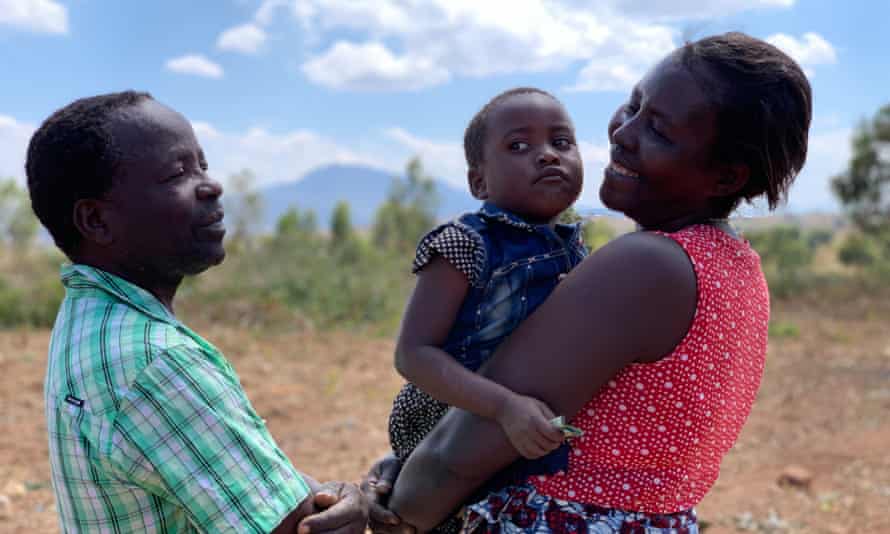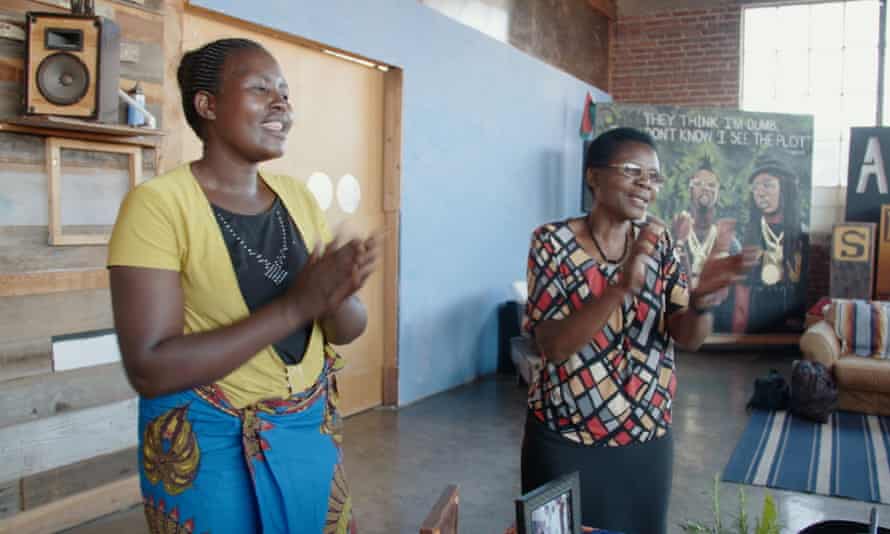A Malawian farmer visiting the US wants to know: ‘Why not do more on the climate crisis?’
New documentary The Ants and the Grasshopper follows Anita Chitaya’s journey from her drought-hit village to meet farmers and politicians in the US

Last modified on Fri 30 Jul 2021 08.06 EDT
What do we owe each other in the face of an existential crisis like the climate emergency? That’s one big question at the heart of The Ants and the Grasshopper, a recently released documentary exploring how power and privilege shape climate justice and food justice from Africa to America – and how we might move forward together.
The film, co-directed by Raj Patel, an author and expert on global food systems, centers on Anita Chitaya, a small farmer and local leader in the village of Bwabwa, Malawi. Like many others in developing countries, she is living in the grip ofthe climate crisis. The rains, she says, have dwindled to three times a year, and the crops can’t survive. All that remains of the nearby Rukuru river is a ribbon of sand snaking across dry land. Every day, women draw water from boreholes that take longer and longer to replenish.
Chitaya is no hapless victim, though. Working with a local organization called Soils, Food and Healthy Communities (SFHC), she helps implement pragmatic solutions to the climate crisis, like clay stoves that use less wood and sharing recipes to make use of new crops. On her one-acre farm, she practices intercropping – growing multiple crops in the same area – to help retain the soil and maximize yield from the parched earth. And she is a remarkably persuasive leader on gender equity, gamely convincing the men of her village to share a daily workload that is usually shouldered by women and grows heavier as they grapple with climate-related issues.
Chitaya traces the emissions from countries like the US to the missing rains in Malawi, and she wants to know why the richest country on Earth and second-largest emitter of greenhouse gases isn’t doing more to stem a climate catastrophe that is already strangling her land. “Lately it feels like both rain and time are running out,” she says in the film. “While the rich are debating what to do, the poor suffer.”
The film-makers arrange for Chitaya and another village leader, Esther Lupafya, a doctor and co-founder of SFHC, to travel to America to talk with farmers and, they hope, elected officials. The goal, Chitaya says, is to “bear witness and tell them what is happening to us here”.
Across the US, they meet farmers and activists that illustrate American intransigence on climate action, the promise of a more just food system and the complexities and constraints that lie in between.
There’s the Goodmans in Wisconsin who run an organic dairy farm and advocate for sustainable farming, but their son flatly denies the realities of climate change saying: “It’s in the Lord’s hands.” Then there’s the Jacksons, a conservative Christian family who switched from conventional to organic farming after their son was born with a heart defect, potentially linked by in-vitro exposure to agricultural chemicals. But their farm isn’t profitable and the father works at a coal-fired power plant for extra money and health insurance. They chalk up shifting weather patterns to normal cyclical changes and view climate change as an “agenda”.
A common refrain we hear from many Americans in the film is, more or less: we just don’t experience the climate crisis here the same way. Or, if they do see the connections, they say it’s simply too hard to farm any other way.
Chitaya and Lupafya gracefully negotiate these denials, clearly frustrated but undeterred. “Change, it starts with denial,” says the ever pragmatic Lupafya.
They find a counterpoint to white climate denial and inaction in grassroots movements by people of color. We meet Black farmers, like the Black Dirt Farm Collective in Maryland, and the D-Town Farm in Detroit, that are working to redress centuries of discriminatory policies around farming and food through regenerative agriculture and community organization.
“On these farms and in these movements, people are not just growing food, but they’re getting together, they are analyzing the world around them together, and then they’re acting,” says Patel in an interview with the Guardian.

It’s these groups that start to stitch together the threads of capitalism, racism and patriarchy that are woven throughout both the climate and food justice crises. They also echo the communal approach and connection to the land that Chitaya practices in Malawi.
“I think that there are movements across the United States that recognize the need for a sort of ‘Black and red and green new deal’. And in those conversations, there are conversations happening about reparations for genocide and for slavery that I think, are absolutely central to discussions about what sustainable food systems should look like,” says Patel.
But while The Ants and the Grasshopper clearly paints smaller, sustainable farming practices as the preferred approach to “spray and pray” mega-farms, it doesn’t set out to prescribe policy on how to fix a broken global food system. Nor is it a guilt trip around racism and climate inaction. Guilt, as Lupafya says, “sometimes just slows you down”. And it’s not a luxury those on the frontlines can afford.
Instead, Patel says the intention behind the film was reach new audiences to start deeper conversations about exactly how we arrived where we are today.
“We don’t want to have the difficult conversations about whether the land was stolen, we don’t have conversations about whether farm laborers are being paid well, we don’t want to have the difficult conversations about whether what we’re doing is killing off species here in the United States, and not making it possible for farmers to farm elsewhere,” he says. “The goal for this film is to be as an entryway into these conversations, so we have that confrontation with power, as [the Black Lives Matter movement] did last year. It’s easy for the food system to carry on pretending the business as usual is OK.”
Ultimately, the message of the film, and leaders like Chitaya and Lupafya, is a call to care – about each other and for each other – and to acknowledge the interconnectivity that links us all, for better or worse, across an imperiled world.
By the end of the film, we see some of the farmers who once denied the climate crisis begin to come around to the reality of the situation. It’s a timely reflection during this summer, as unprecedented waves of extreme weather continue to batter areas of the world that have long been isolated from the worst impacts of climate disaster.
Chitaya, for her part, remains optimistic. Even after the frustrations of her trip to the US, she says she still draws hope for the potential for long-term change from her experience working on gender equity in her village.
“Seeing that we can have peace, and that it is possible to live in harmony and to live equally and to make change happen, encourages us to spread the word,” she says via email. “We can teach each other … to change.”
-
The Ants and the Grasshopper is on the festival circuit in 2021. In the US it will be available to view online through the NH docs film festival 11-15 August, and at the Middlebury new film-makers festival 25-29 August in Middlebury, Vermont. In September it will be screened at the Ashland film festival in southern Oregon, both live and virtually. In Europe, it will be screened at the Human rights film festival in Berlin, Germany, 16-25 September. And it will be touring the UK with Take One Action.
